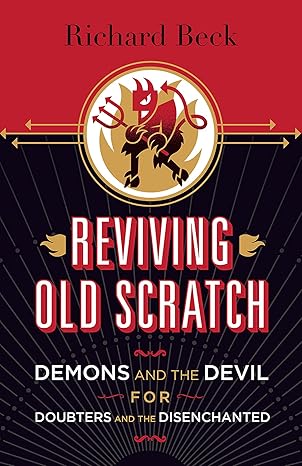Tonight, we are discussing Chapter 7, “I Love Humanity. It’s People I Can’t Stand,” and Chapter 8, “God at War,” of Richard Beck’s book Reviving Old Scratch: Demons and the Devil for Doubters and the Disenchanted. In Chapter 8, Beck expands upon his discussion of faith and suffering, which he first addressed at the end of Chapter 2. pp.25-26.
Whence Evil: (pp.79-81)
Beck begins this chapter with a discussion of his experience with suffering while working in a psychiatric hospital. The pain and suffering he saw overwhelmed him and caused his faith to wane significantly. Going back to the Greek philosopher Epicurus in the 4th century B.C., the existence of suffering and evil has long been a significant argument against the existence of God. Epicurus poses a trilemma: (1) If God is willing to rid the world of evil but unable, God is impotent; (2) If God can rid the world of evil but unwilling, God is not good; (3) If God is both all-powerfully willing and all-good, then why does evil exist? Evil exists; therefore, God does not. This is where Beck found himself.
Irrationality of Evil: (pp.81-82)
Beck, however, writes that he realized evil is not a logical problem to be solved but a reality to be resisted. As we previously discussed in our Genesis lesson, evil is a privation of the good and does not exist independently (like a hole in a piece of paper). Since God (particularly in the Logos) is the very foundation of rationality and intelligibility, evil necessarily defies explanation and comprehension. It is a fool’s errand to make sense of evil, suffering, and death. “Our mind,” as Beck writes, “starts running in a circle, chasing its own tail.” p.81
Scripture’s Approach to Evil: (pp.81-83)
Rather than approach evil logically, Beck points out that the Scriptures simply assume its reality and call us to resist. “The Biblical writers cry out to God in the face of oppression, injustice, and violence, beseeching God to act.” p.81. For example, this is how the story of the Exodus begins – the enslaved Israelites cry out, and God raises up Moses to deliver them from evil. Ex. 3:7-10.
Our response to suffering, therefore, should be behavioral, not philosophical. Beck argues that suffering and evil should serve as a call to action. Jesus and the writers of the New Testament never tell us why there is suffering and evil in the world, beyond its personification in Satan, et.al. (that question was reserved for later theologians). Instead, Jesus went about alleviating suffering and exorcising evil.
God is at war. The question is not the “why” of the enemy, but its ultimate defeat. This is John’s vision in Revelation. In the face of suffering and evil, this should be our vision as well.
(If you want to go deeper into this question and answer, a good accessible book is David Bentley Hart’s The Doors of the Sea, written in response to the December 26, 2004, Indian Ocean tsunami. A review of the book is here.1)
Dinner is at 6. The menu is baby back ribs. Discussion around 6:45. Compline about 8. Hope to see you here!
The privation theory of evil is not a shallow disregard or denial of the evident evils in the world. It means rather that, confronted with the evils in the world, we can only say that for no reason, and therefore outrageously, the world as we find it does not perfectly love God, the Good, the sole end of all love. And since the Good is the principle of intelligibility and hence of being, to the extent that anything fails to partake of that principle, it is deficient in being. The recognition of evils in the world and in ourselves is the recognition that the world and ourselves, as we find them, are less than fully existent because we do not perfectly love God, the Good.” Eric Perl, Theophany, p.64.

